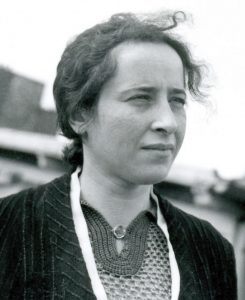Siobhan Kattago at the Institute of Art and Ideas:
 In the current political climate of populism and xenophobia, it is tempting to simply close the door and withdraw from public affairs. Indeed, there is a pervading sense that there is no alternative to our polarised politics, neoliberal capitalism and corruption. Pleas for solidarity among nation-states seem to be easily overshadowed by resentment towards foreigners and nostalgia for lost national glory. And yet, it is precisely such retreat into the private realm that Hannah Arendt warned against during the 20th century. It is during moments of political crisis that individual potential for new beginnings matters most; it is in times of political division that we are faced with the task of cooperating and finding a way to share our fragile world.
In the current political climate of populism and xenophobia, it is tempting to simply close the door and withdraw from public affairs. Indeed, there is a pervading sense that there is no alternative to our polarised politics, neoliberal capitalism and corruption. Pleas for solidarity among nation-states seem to be easily overshadowed by resentment towards foreigners and nostalgia for lost national glory. And yet, it is precisely such retreat into the private realm that Hannah Arendt warned against during the 20th century. It is during moments of political crisis that individual potential for new beginnings matters most; it is in times of political division that we are faced with the task of cooperating and finding a way to share our fragile world.
Withdrawal from public affairs is more than a sign of cynical escapism and alienation; for Arendt, it denotes the situation of ‘worldlessness,’ whereby the sense of shared reality begins to disintegrate. Worldlessness is like a desert that dries up the space between people. By resigning ourselves to the belief that political engagement is futile, we remove ourselves from the world and from one another. As Arendt argues in Crises in the Republic (1972) and her posthumously published The Promise of Politics (1993), when we lose touch with the world, we experience a dangerous ‘remoteness from reality.’
More here.
